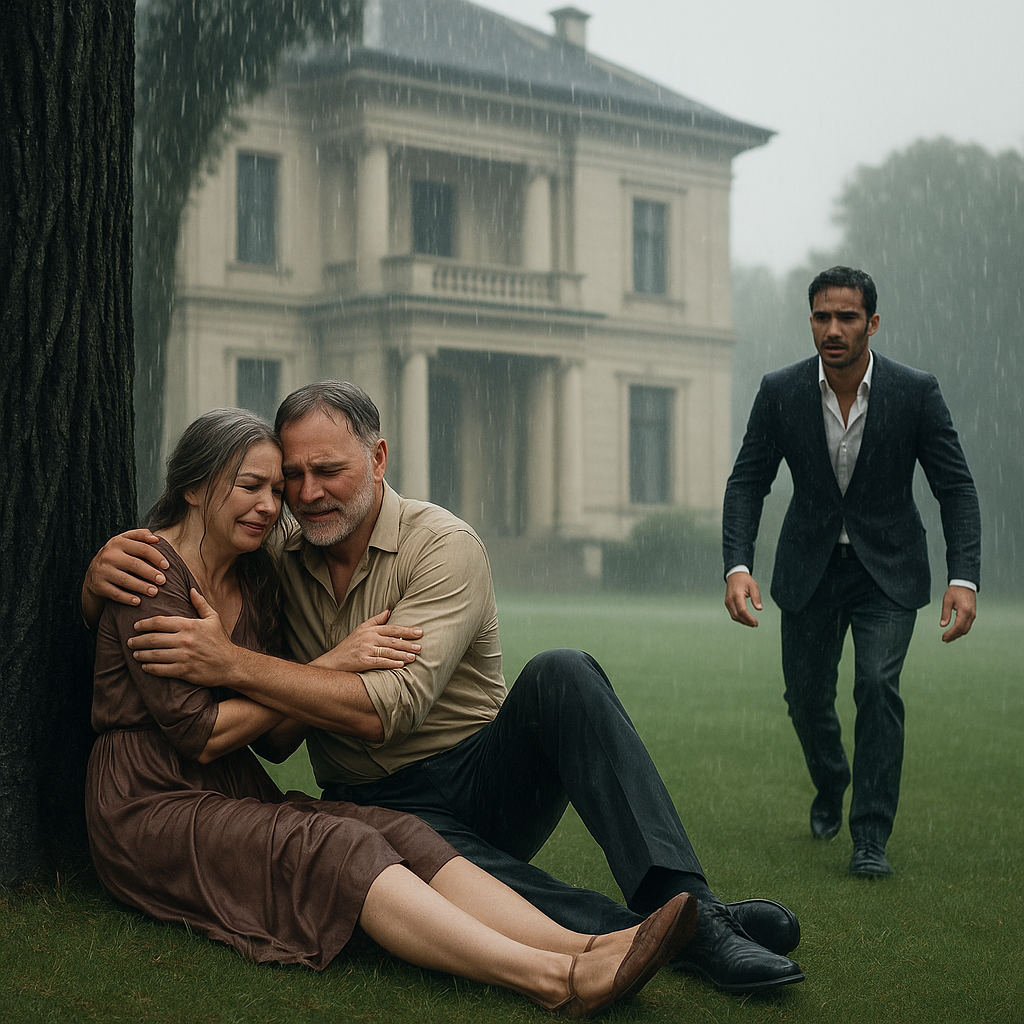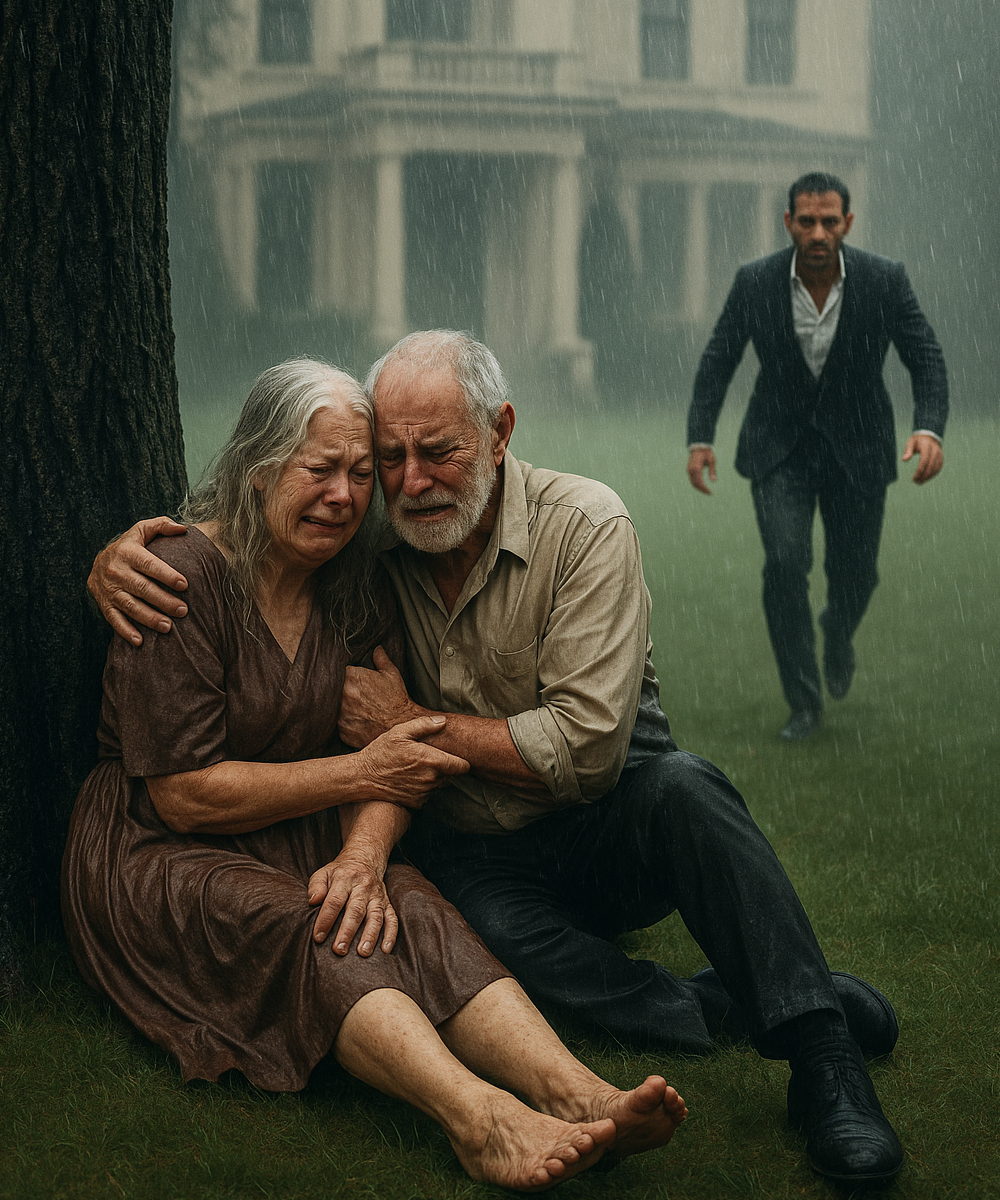The private jet gracefully touched down at Santiago’s airstrip, gliding silently through the morning mist. Sebastián Ferrer emerged, his expression hidden beneath dark sunglasses. At forty-five, he had transformed from a boy in southern Chile into a global entrepreneur, establishing impressive offices in key financial hubs like Hong Kong, New York, and London.
His existence was flawless—gleaming steel, polished marble, and an echo of silence. Success had become his protective shield, with solitude as the price he willingly paid. It had been nearly six years since he last saw his parents, Manuel and Carmen. Their calls were infrequent and brief, always ending with his mother’s familiar reassurance, “We’re fine, son,” even when he sensed the underlying truth. To alleviate his guilt, he resorted to his usual method: throwing money at the issue.
He had allocated half a million dollars to his cousin Javier, conveying straightforward instructions: “Construct the finest home in the village. Ensure they have everything they require.” However, on that particular morning, a significant deal in Asia fell through, presenting Sebastián with an unexpected forty-eight hours of free time—an anomaly in his meticulously orchestrated routine.
Peering out from his office window at the snow-dusted Andes, he experienced an odd sensation—nostalgia, although he misidentified it as boredom. He felt compelled to see the house he financed, to witness his parents living in comfort. Unexpectedly, he decided to act without informing anyone. Skipping the chauffeur and assistant, he climbed into his sleek black Mercedes G-Wagon, programmed his hometown’s address into the GPS, and set off southward toward a past he believed he had left behind.
The Tempest
The highway soon transitioned into winding lanes and then rough gravel roads. The once sunny Santiago skies turned ominous gray, leading to an unrelenting downpour—a storm typical of the region’s south.
As rain hammered against the windshield, memories surged back. He recalled the sound of dripping water from leaky roofs, the scent of damp wood, and the icy discomfort of wet clothing. He had vowed never to experience that kind of chill again.
With arrogance, he thought, Not anymore. His parents were likely safe and dry behind a double-glazed window of their newly constructed, cozy home. He anticipated seeing evidence of his success.
However, upon arriving in the village, everything appeared diminished, dull, and impoverished compared to his recollections. The once-vibrant wooden houses had dulled to gray and were weathered. He turned onto the old street of his childhood, expecting to find a bright new residence.
Instead, he encountered the same old, fragile home, sagging under years of relentless rain.
And then he spotted them.

Rain and Revelation
His parents were outside in the pouring rain, not sheltered by an umbrella as they faced the elements head-on. They stood amidst their drenched furniture—a waterlogged velvet couch, collapsing cardboard boxes, and a television struggling to remain dry inside a torn plastic bag.
They were being evicted.
Sebastián halted in the middle of the road, stunned. His mother, frail and small, attempted to shield the boxes with trembling hands, while his father, once robust and dignified, stood motionless, gazing at their locked home’s door, where two men were replacing the lock.
For the first time in years, Sebastián felt utterly helpless. He exited the car without his coat or umbrella, the rain immediately soaking him through.
“Papá! Mamá!” he called out, his voice cutting through the tumult.
They turned, but rather than relief, their expressions conveyed humility. His mother shielded her face, while his father tried to maintain whatever dignity remained.
“Sebastián,” his father said softly. “You shouldn’t be here, son. This isn’t a good time.”
“Not a good time?” Sebastián’s voice escalated with anger. “What is happening here?” He turned to the men at the door. “Who are you? What are you doing to my parents’ home?”
One man nonchalantly presented a document. “We’re from the bank, sir. The property has been repossessed due to an unpaid mortgage. Today marks eviction day.”
“Mortgage?” Sebastián stumbled over his words. “This house was paid off four decades ago!” Frantically, he looked to his father. “Papá—what about the money I sent? The half million? The new house? Where’s Javier?”
At the mention of his cousin, Carmen began to sob quietly. Manuel bowed his head. “There is no new house, Sebastián. And no money. Javier… he asked us to sign some papers, claiming they were for permits. The construction never commenced. Subsequently, letters from the bank arrived. He said it was a mistake… that he would rectify it. We didn’t wish to burden you, son. You were so occupied…”
A Confrontation
Sebastián felt tension in his chest. His cousin—family—had taken the funds intended to support his parents and leveraged it against their sole residence. His presence and arrogance had enabled this situation to unfold.
At that moment, fate seemed to mock him, as an old car parked behind the Mercedes. Out stepped Javier, wearing a smug grin that vanished upon seeing the scene unfolding in front of him.
He momentarily lost color and attempted to retreat, but Sebastián outpaced him. “You’re going to prison, Javier,” he declared calmly, his voice icy. “But that won’t suffice. I will ensure you spend your days paying for today’s actions.”
He turned to the bank employees. “What’s the total debt?”
They revealed the amount, trivial for Sebastián but monumental for his parents. Without hesitation, he retrieved his phone. “Transfer the total to this account,” he instructed his banker. “And inform the branch manager that I’m acquiring this debt. The eviction stops immediately.”
He hung up and faced the men. “Leave your tools. This property is now mine.”
Overwhelmed by the authority radiating from the sopping wet man, the workers stepped back. Javier attempted to flee, but Sebastián grasped his arm. “You’re not leaving until the police arrive.” Another call was made, this time to his lawyer.
The rain continued to fall heavily, blending with the tears he could no longer conceal.

Path to Redemption
As the turmoil subsided, only Sebastián and his parents remained in the muddy street, surrounded by their drenched possessions. His mother gazed at him, uncertain whether to express gratitude or fear. Their father stood speechless, lips trembling.
Finally, Sebastián whispered, “Forgive me. For my absence. For believing money could substitute my presence. I let you down.”
His mother rushed into his arms, embracing him tightly—the once powerful man, who ruled skyscrapers, now a broken son finding solace in his mother’s embrace amid the rain.
He surveyed the dilapidated neighborhood—the crumbling homes and the observers peeking cautiously from their windows—and something shifted within him.
“Tomorrow,” he announced, “the demolition starts. But not just for this house.”
His parents exchanged confused glances.
“I’m purchasing the entire street,” he elaborated, his resolve unwavering. “I’ll construct new homes for every retired couple here. Safe, warm, dignified homes. A clinic, a community dining hall… and it will be named the Manuel and Carmen Foundation.”
He smiled faintly. “And I won’t assign anyone to oversee it. I’ll remain here, running my business from home.”
A Fresh Start
Months later, the previously forgotten village buzzed with life once more. Where mud and decay had reigned, bright, sustainable homes sprang forth—full of vitality. Workers chuckled as they labored, and each morning, Manuel and Carmen welcomed them with coffee, proud hosts of their son’s newfound legacy.
In jeans and work boots, Sebastián personally managed the project. His company had transitioned southward, reviving jobs and hope in a place time had forsaken.
Javier faced the consequences of his actions, and Sebastián discovered something no amount of wealth could ever provide him—true peace.
He learned that while money could procure houses, only love and presence could forge a genuine home.
